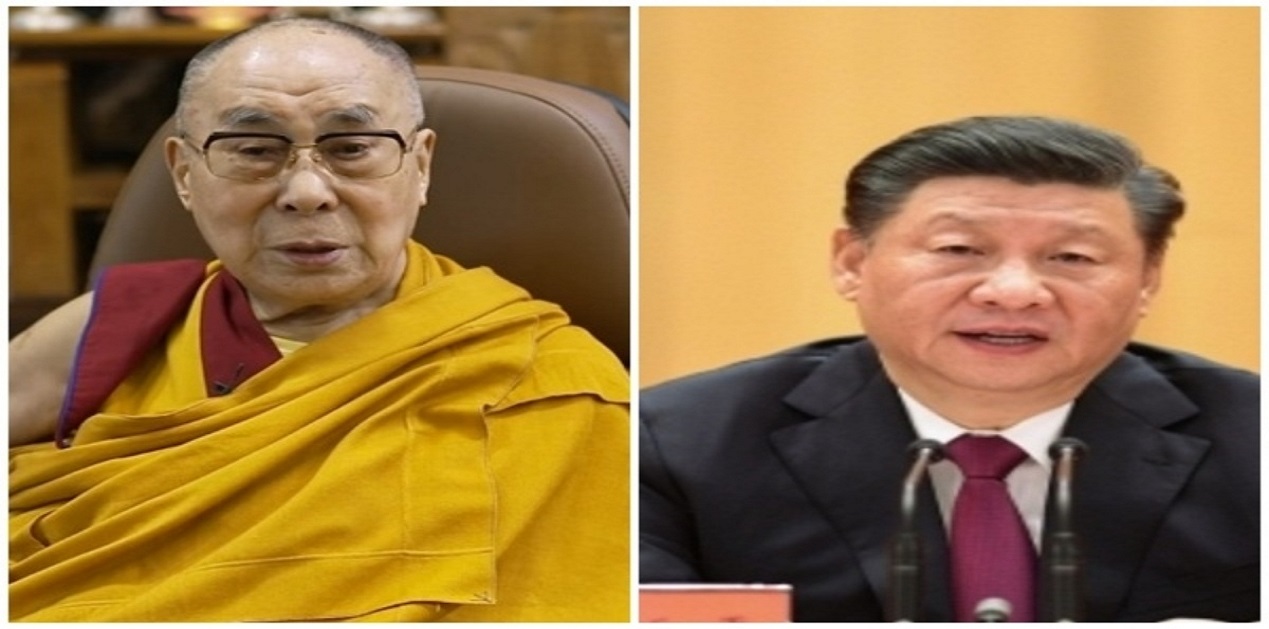Chinese President Xi Jinping has increased efforts in recent months to try and erase the XIVth Dalai Lama’s influence inside Tibet and among the growing number of adherents to Buddhism elsewhere in China. This suggests an apparent urgency to ensure that the exiled Dalai Lama’s reincarnation, when the situation arises, will be nurtured by tutors compliant with the Chinese communist regime and later remain in the firm grip of the Chinese Communist Party (CCP). The spectre of two Dalai Lamas -- one quite outside Beijing’s control – like presently in the case of the Panchen Lama, though one of whom has been secreted somewhere among China’s 1.4 billion people, haunts the Chinese communist leadership.
Beijing’s fear is that a Dalai Lama outside the CCP’s control would continue to be revered by the Tibetans and other Chinese Buddhists as at present. The reincarnate could also persist in raising issues such as the freedoms and human rights of Tibetans and, as China’s relations with the West and Europe get progressively strained, put China under increasing pressure. The Dalai Lama nominated by Beijing will also not be accepted by the Tibetan people, much as the Chinese-nominated Panchen Lama, Gyaltsen Norbu, is only now after 25 years beginning to be acknowledged, but as just a “learned monk”!
Beijing’s apprehensions are reflected in the new regulations issued late this January and imposed across the Tibet Autonomous Region (TAR)’s seven administrative districts and Tibetan areas in adjoining provinces. On January 25, a directive to all districts and municipalities of the TAR mandated that workers employed in Tibetan government offices, schools or hospitals must be “trustworthy and reliable citizens” and remain loyal to the CCP. It instructed them to renounce the Dalai Lama and his followers and, referring to the group of supporters surrounding him, his “clique.” Continuances in employment and promotions have been made conditional upon such a declaration.
The same month the TAR authorities reiterated warnings to officials to be loyal to the CCP. At a two day symposium in Lhasa and Shigatse on January 13-14, officials and leaders, including those who had retired, were urged to always have a clear-cut and firm political stance especially in opposing “separatism,” safeguarding national unity and in drawing a clear-cut line from the “Dalai Clique.” They were told that the party will not tolerate “two-faced” people.
Efforts have been made at regular intervals to curb worship of the Dalai Lama, compel Tibetans not to keep photographs of the Dalai Lama in their homes, and weed out “double-faced” cadres, or those working for the TAR government while concealing their loyalty to the Dalai Lama, and prevent Tibetans from crossing into India for an audience with the Dalai Lama. There was an uptick in warnings by TAR leaders against ‘separatist’ elements and "double-faced” cadres prior to Xi Jinping's visit to Tibet in July 2021. These efforts have met with negligible, or very limited, success. This year, however, the regulations, which threaten punishment, are likely to be more stringently enforced as they come in the politically sensitive run up to the 20th Party Congress scheduled for later in the year.
At the end of January another new law “Measures for the Administration of Internet Religious Information Services” was promulgated. Due to take effect from March 1, this law prohibits, or severely limits, efforts to spread religion or disseminate religious teachings through online channels. Curbs on monks giving ‘teachings’ in Tibetan Buddhist ideology are already in force in Zhejiang and other provinces. The latest regulation orders Tibetan social media groups affiliated to religion to disband or face punishment. It decrees “All online coordinating of religious activities and related events will be banned”.
The Chinese leaders are simultaneously striving to promote Gyaltsen Norbu, whom they appointed the Panchen Lama in 1995. The Panchen Lama has an important traditional role as the reincarnate Dalai Lama’s Tutor. The Dalai Lama performs a similar function for the Panchen Lama. Gyaltsen Norbu has been gradually sought to be introduced to the Buddhist clergy and believers. In 2006 he attended the China-sponsored World Buddhist Forum -- his first international gathering and gave a speech in Tibetan on Buddhism and national unity. In 2012 he travelled outside Mainland China for the first time to attend the World Buddhist Forum in Hongkong. It was only in mid-May 2019 that he made his first international trip and visited Thailand.
More important, though, is to have Gyaltsen Norbu accepted by the Tibetan people. The Tibetans inside China and in exile continue to recognise Gedhun Choekyi Nyima, who was born on April 25, 1989 and recognized by the XIVth Dalai Lama on May 14, 1995, as the 11th Panchen Lama. China’s communist rulers took Gedhun Choekyi Nyima away on May 17, 1995 and there has been no word of him since. On February 3, 2010, Norbu was appointed Vice President of the Buddhist Association of China.
He was brought to TAR for the first time since his ‘enthronement’ as Panchen Lama, in 2018. During the three-month visit he travelled to Lhasa, Lhoka (Shannan) and the Panchen Lama’s traditional religious seat of Shigatse. He also visited the sacred lake of Lhamo Lhatso. He met people in these three prefectures and conducted religious Buddhist activities. Gyaltsen Norbu visited Tibet again in 2019 and 2020 for a two-month sojourn on each occasion. In 2019, he for the first time travelled to Nagchu and Ngari and spent 20 days there. The numbers of Tibetans attending his religious teachings has grown each time, but are still considerably fewer than at the time of his predecessor the Xth Panchen Lama.
Gyaltsen Norbu’s longest stay in Tibet thus far was in 2021 when he stayed for three months and conducted various Buddhist religious activities and visited villages, monasteries and entrepreneurial centres. He went to eleven monasteries of different sects, including Narthang monastery, Gyantse Palkor Chöde Monastery, Ralung monastery, Shalu monastery and Yungdrungling. He also attended the 70th Anniversary of the “liberation of Tibet” with the other dignitaries from Beijing, including Chinese President Xi Jinping. On October 26, 2021, in the presence of 800 representatives of monastic Teachers from various sects of Tibetan Buddhism he was conferred the title “Ka-Chen”, equivalent to a doctorate in modern education. He returned to Beijing at the end of October.
The China-appointed Panchen Lama Gyaltsen Norbu has also been used to propagate that Tibetan Buddhist monks and nuns should “love the nation” and “adapt Buddhism to socialism with Chinese characteristics”. During his visits to monasteries, Gyaltsen Norbu has reiterated that “loving the party, the country, and the religion is the key to Tibetan Buddhism's continued inheritance and entry into the next century”. He has also emphasized that “the Communist Party of China has allowed all Chinese people to live a happy and peaceful life, and has given Asia and the world a better guarantee of peace. This is exactly what Buddhism has pursued for thousands of years, and the Chinese Communist Party has achieved it in 100 years. Without the Communist Party of China, there would be no peaceful and peaceful New China, nor would there be a happy New Tibet today.”
Despite the persistent efforts of the Chinese communist leadership, protests by the Tibetan Buddhist clergy and ordinary Tibetans in TAR and Tibetan areas in adjoining provinces continue to be reported. The successive campaigns against the Dalai Lama and to ‘sinicise’ Tibetan Buddhism have yielded negligible results. The number of Tibetans in TAR being prosecuted for endangering ‘state security’, which includes subversion, ‘splittism’, incitement to subversion or splittism, espionage, and violations of state secrets has increased since 2018. The number of Tibetans in TAR prosecuted on charges ofendangering ‘state security’ rose from 37 in 2019 to 74 in 2020. Another 15 Tibetans were sentenced in the Ganzi Tibetan Prefecture in western Sichuan. Figures for other Tibetan regions in the Sichuan, Gansu, Ningxia, and Yunnan provinces are not known.
Matters are likely to become more complicated for China during the period the XIVth Dalai Lama’s reincarnation, or 'emanation', is settling in. The worldwide networks of Tibet Support Groups, the Tibet Information Network and Friends of Tibet Parliamentary Groups can be expected to become more active in projecting the XIVth Dalai Lama's successor and his policies. Tibetan youth in exile will make a push for their cause of independence, giving a fillip to those inside China resisting China’s occupation of Tibet. A further complication will be in case, as is probable, the successor is discovered in India!
(The paper is the author’s individual scholastic articulation. The author certifies that the article/paper is original in content, unpublished and it has not been submitted for publication/web upload elsewhere, and that the facts and figures quoted are duly referenced, as needed, and are believed to be correct). (The paper does not necessarily represent the organisational stance... More >>
Image Source: https://www.thestatesman.com/wp-content/uploads/2021/09/732e56781edecb3f1f89a807794993e6.jpg











Post new comment